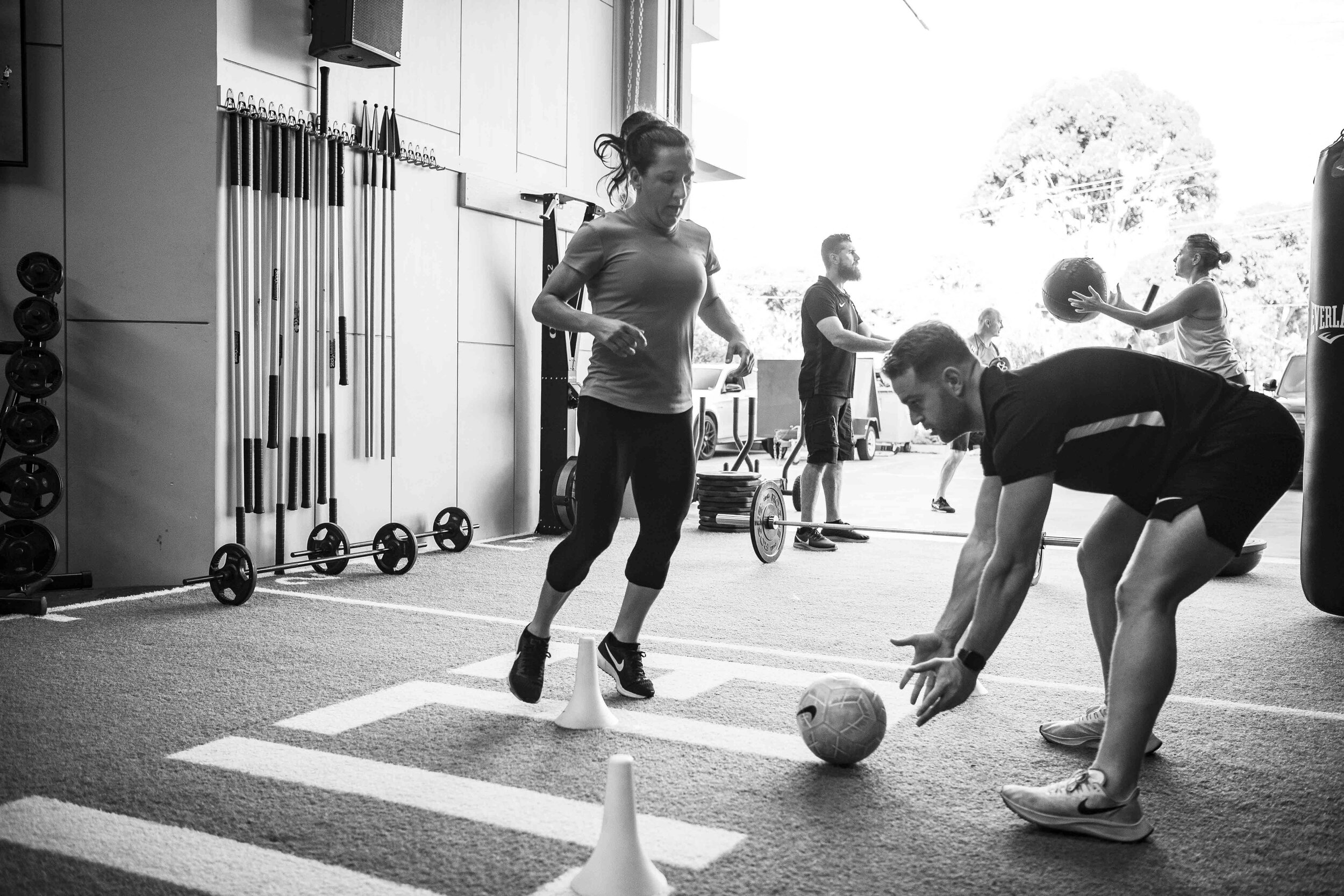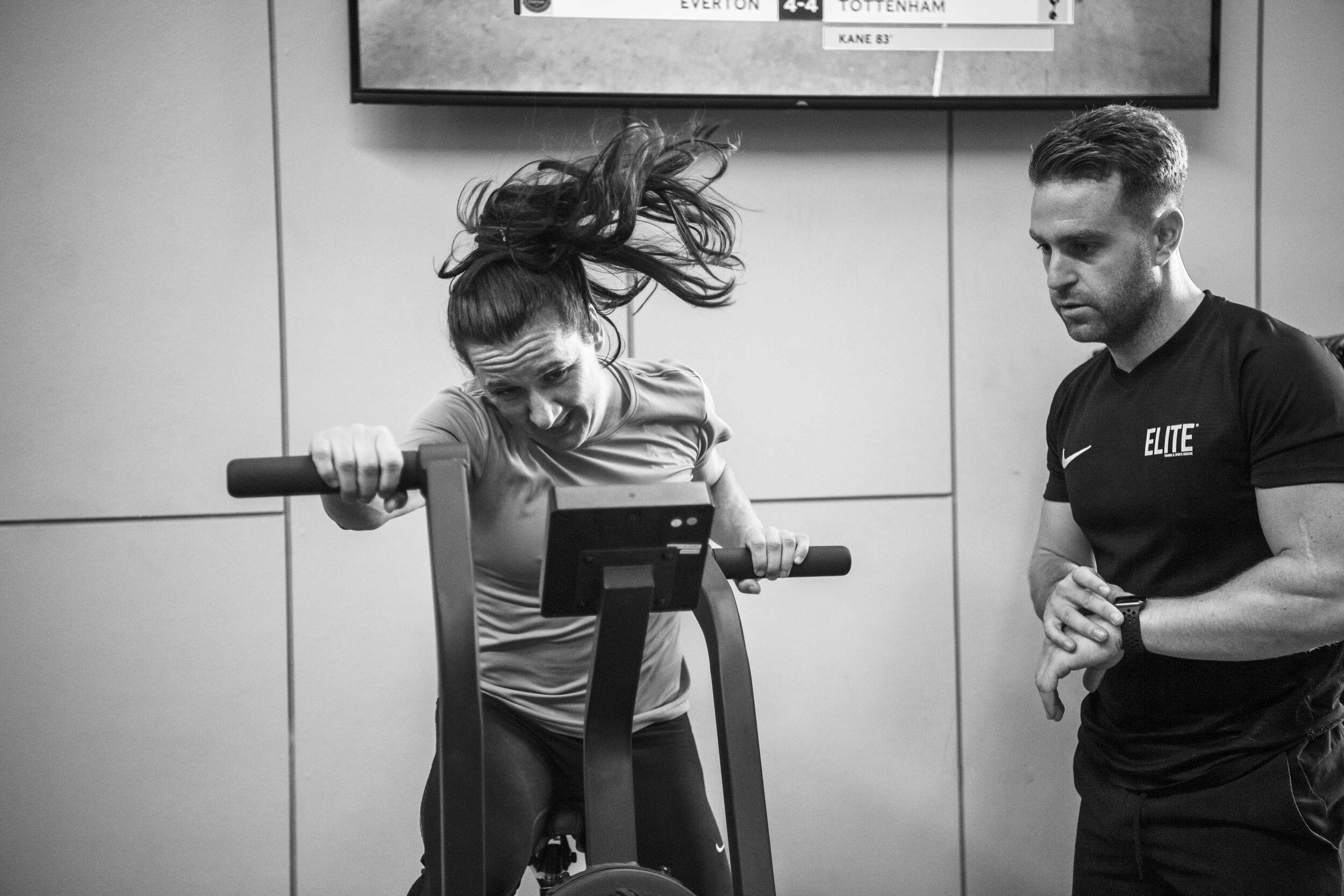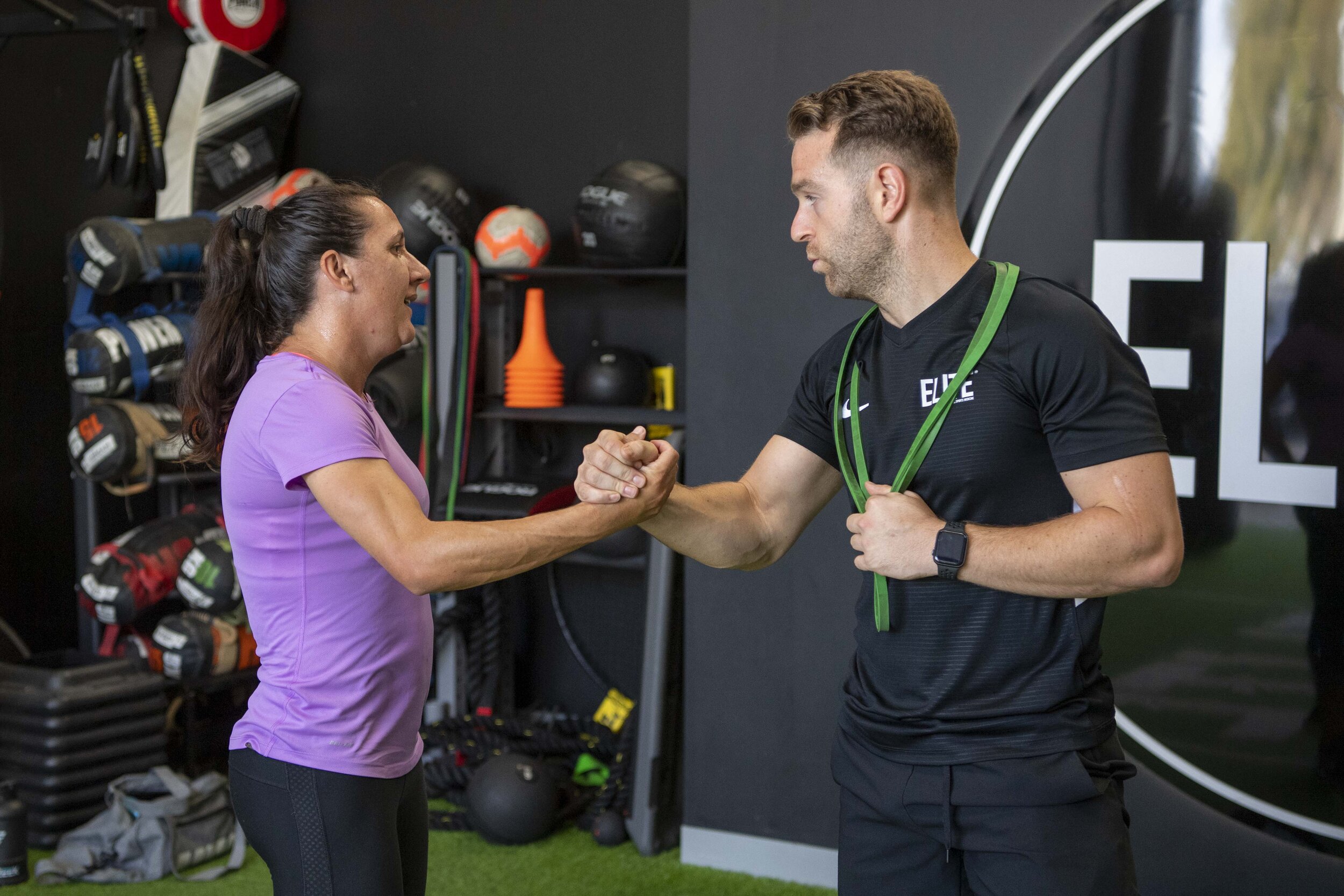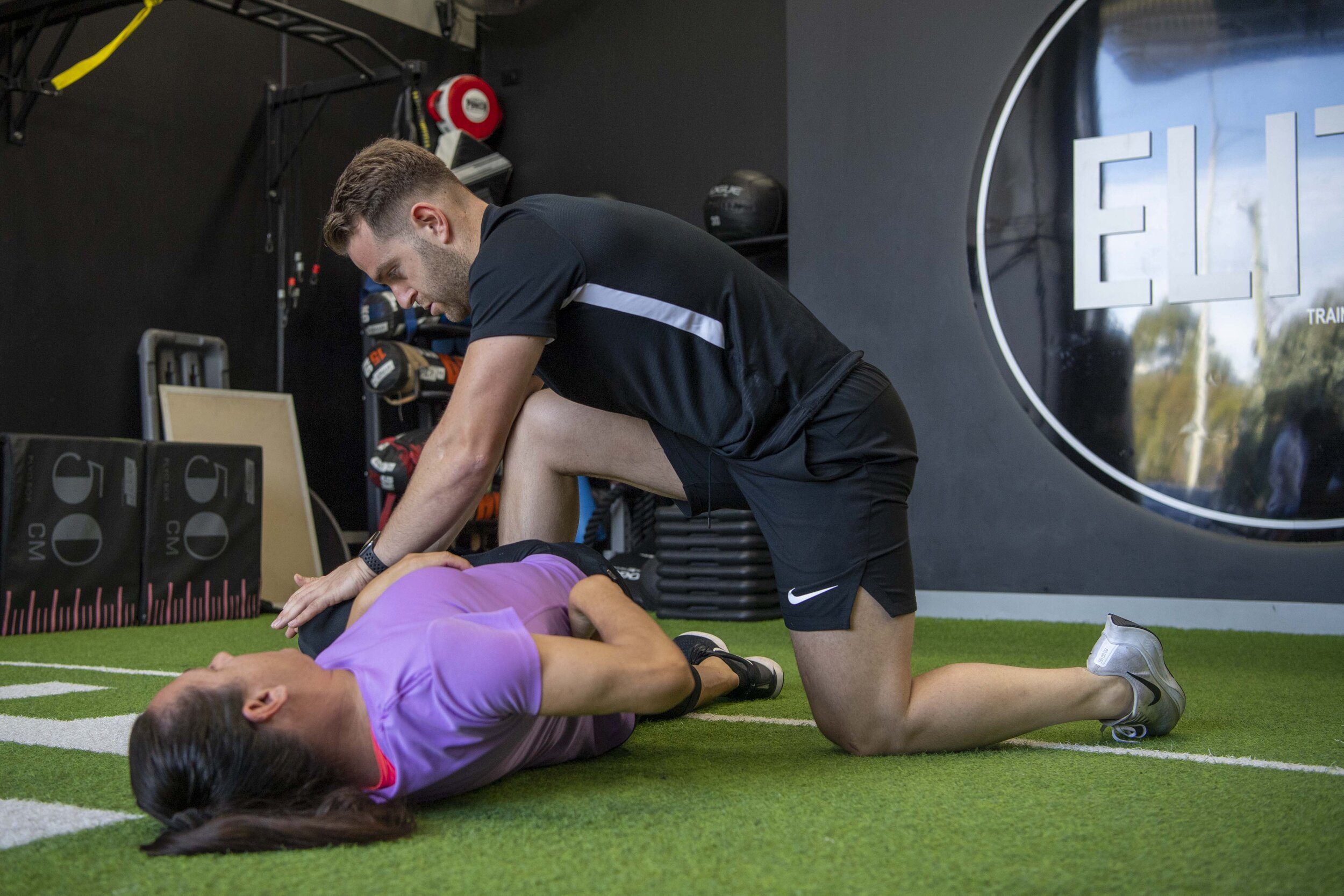Football is. Wellbeing
SPort and the art of Positivity | MIKE VARKO
It’s almost a cliche now, but when you hear the phrase ‘2020 was a year like no other’ it certainly rings true. 2021 is looking interesting to say the least.
The wonderful thing about producing the Football is. series of blogs has been sharing the different stories from our Football community and reflecting back on COVID-19 and it’s impact. Over time you cross paths with quite a few people and you don’t often get a chance to actually meet them. In the very small world of sport you will inevitably be drawn together and eventually meet. I’ve followed Elite Training & Sports Medicine and the work of Mike Varko on instagram for a while. Established in 2017, the Keilor East based facility is the creation of Vince Ozalp, Sam Kolay & Mike Varko. This collaboration ensured that the facility could be targeted to athletes from all walks of life. While also playing to the different passions of Vince, Sam and Mike. It came about mainly through a love of football, obstacle course racing, and the sports medicine side of things. The services offered by ELITE! are geared to people of all levels of ability with the standard of training that would be expected by professionals. The objective is to offer clients the standard of training recovery & advice expected by a professional sporting environment but to all levels of ability.
This background is an important context for this interview. I first heard from Mike Varko during lockdown. He had been engaging with my blog and pitched the idea that it would be interesting to look at the impact of COVID-19 from a coaching perspective and how you prepare people for life during and after COVID-19.
When you look at the types of clientele that come through the doors of ELITE! it’s easy to think that they only work with professionals. However, its’ much more nuanced than that, their program can be geared to people of all ages, abilities and background in sport.
If the last twelve months has taught us anything it’s that we should expect plans we make to change at short notice, to not sweat on the small stuff and that maybe looking at the big picture wouldn’t hurt from time to time.
Football is. Mike, can you give me a general run down of the different services that you offer your clients?
We've got a strength and conditioning programme that's offered to all abilities. A personal training programme that is catered for the general public. A Youth Athletics development program, Myotherapy & Soft tissue services as well as Clinical Pilates & our Recovery lounge to revitalise the body.
Football is. When you walk in here, you're immediately taken by the different areas you've got in the facility. How did you come about deciding how to structure the space and how to put it together?
It was a matter of designing and creating the vision in our heads. We've basically replicated what we've decided to build in a facility with the recovery side of things as much as the physical side of things, as it's so important to be able to have a facility that caters for everything, rather than just the physical side of things. We thought we'd spread out the venue to offer our clients all services as a one stop shop.
Football is. What area are you specifically trained in?
Sports & Exercise Science & Athletic development & Football conditioning.
Football is. If an athlete comes to you with an injury. What is your process?
In the first instance it is the assessment of the athlete by the Sports medicine team, where they'll assess them in a clinical format. The data will then be processed by the person who's taking care of the athlete then we will liaise and sit down and form a structured protocol to be able to program the training for the athlete.
Football is. One of the things we were talking about prior to the interview was that you're training tennis players, jujitsu and a range of different types of athletes, with one of your major focuses being football (soccer). With football being one of your primary focuses. What role do you think you can play in working with a professional A-League player or NPL, Community club level player?
Well, it's having experience with high level athletes, from an English Premier League level that we've worked with in Dubai to an elite level here in Australia, where we've studied and researched and provided the form of training all athletes can be a part of.
Football is. You do some work with A-League and W-League players. When you're working with those players, I would imagine that they will have their own coaches and their own elite facilities. So, why would they come to you?
We offer a different service, sometimes in a group setting, the attention is not on a individual athlete. So, these players come to us for specific training measures, ranging from a more structured mobility and stretching to a more condensed recovery routine. As well as specific so anywhere between a midfielder, defender or forward has different protocols that they need to meet, to get to that next level. We break down that specificity to that athlete to be able to get to that level of match fitness.
Football is. I know that you do some work with Jaimie McLaren of Melbourne City. At the time of the lockdown, City were heading into the finals. And then suddenly, everything stopped and there was talk about bubbles. From your perspective, how did that impact on you and the work you do with the elite athletes?
During that time, when there was finals coming up, and there was a discussion of where the finals would be played. Jamie McLaren was the only A-League player coming to see me at the time. I had Alex Chidiac with me as well. Who was in for rehab, who plays over in Madrid. So I had those two athletes with me. It was a matter of programming and structuring to their needs specifically. We didn’t have long until Jamie had his finals to play. We had Alex flying over to Madrid to play a Champions League game, so their was a good training block.
The importance of a positive MINDSET
Football is. When it got to the point where you couldn’t see them in person, how did you go about restructuring the way you would work with them remotely?
It would be a matter of a phone call or a Zoom chat that was really popular during COVID. Or it'd be just a basic checkup on WhatsApp to see how they're tracking. It could be something as simple as having pulled up sore on the right hamstring or I'm at home now is there anything else that I could do that will make me feel better for the next day training. And that communication was done quite daily. Which is great. Sometimes when you have that relationship with the athlete their more accustomed to come to you and speak to you about it. And I feel that here we build that relationship quite genuinely.
Football is. It's been quite a year with many restrictions and a lot of down time for the businesses. I imagine there would have been a bit of soul searching. What were the things that you put your energy towards thinking about life post COVID-19?
I tried to stop thinking about what's important after COVID. I started thinking about what's important in the current time. I started doing some gratitude training myself. I started focusing on things that I'm grateful for. Things like family, looking up at the sky and seeing the colour and the day. Things that I wasn't doing when I was here in the business or working with everyone else. So it was a step back for me rather than step forward. But now that I've come back into things, I feel a lot fresher and I felt like I've taken five steps ahead and so ready to fire up for the upcoming season up.
Football is. When you think about the gratitude training and valuing the small things. How do you think this influences the way you approach the business site of ELITE moving forward?
Yeah, absolutely. So it was a little bit of a trial for me. Gratitude training has allowed me to have perspective. I can now help my athletes with what I went through during that period. And it's as simple as writing things down. I feel as though my head gets so blown up with different things during the day that I don't write them down, and I forget things. I usually have a diary that I take around with me, whether I'm in the car or on my break. I will write things down that are important to me, that I think I need to change my emotional reaction to. Things where I could have attempted things a lot better, and how I'm feeling at the current moment. So I rate myself on how I'm feeling from one to ten twice a day in the morning and evening before I go to bed. I think that plays a big part in the process of building myself as a coach to lead by example.
Football is. Can you explain a little bit about what gratitude training is?
Gratitude training is the ability to know how you are feeling and how to apply your feelings to whatever you may be doing. So whether you’re training as an athlete, or it's your coaching as a coach. It’s the ability to know exactly how you feel and how you can apply your feelings to become a better athlete or coach.
Football is. It is fair to say that it is about mindset and how to apply those learnings to your own personal life?
Absolutely, yeah. Sometimes our personal life affects our professional life, so it's really important to divide the two especially in this industry. You need to give your full attention to the athlete. So it's important to have a clear mind. And these things don't just happen by rocking up to work. They happen in the downtime at home. So, however you can help yourself with your gratitude and appreciating what you have now, is a big part of you becoming a professional.
Football is. With mindset in mind. If you think about the type of work you do, it can be very challenging on a multitude of levels. For you as a coach it can be about the result without thinking about the person. How do you get the most of the best out of you, but also the best of the athlete while also thinking about them mentally?
My talent comes through the ability to read body language. And that starts as soon as the athlete walks through the doors. So, I'm able to sense how that athlete is feeling at the time, by just looking at his/her behaviour. I always say, having the talent to adjust a program on the spot is far more important then writing the program to begin. Nobody is ever going to be 100% ready, its how you can adapt to cater for the circumstance.
Football is. So, it's really about getting to know the person?
Absolutely, yeah. Because whether it's an athlete or a coach or a general person coming through the doors, you've got to be able to have open communication. Everyone should trade treated equal, and it's important for the person to be able to communicate with us. We are always reachable, our phones are always on and that’s part of our job.
Football is. How do you think that the extra time that this year has afforded you, has prepared you for the next 12 months in the way that you approach everyday?
The COVID break has actually given myself and my business partners an opportunity to have an evaluation of how things were running before it stopped. And it was just a matter of writing things down again, like we do with our strategy training, together as a team, goal setting and seeing where there was a gap in the training methods that we were applying and the structure that we had programmes going for. The future for us, is endless. We feel that we have a lot to give. We haven't reached a full potential. I think there is a huge, huge pathway for conditioning in football, that still has a long way to go. I think we're moving out of that phase, where there's just a cricket pitch in the middle of the football ground locally now, to going into the club rooms for beers. I think now that athletes have access to a facility like this. That they are be able to get the recovery done with the right sort of principles of what's in their training in a match specific scenario. I'm really excited in the future, and what it may hold for local athletes and junior athletes going up.
Football is. Let's just focus on NPL for a minute, worked with a number of Victorian NPL Clubs. You may have an NPL player with a niggling injury that can't get the help they need at the club because of lack of resources. Where do you see yourself in the food chain, when it comes down to being at that community level?
We understand how challenging it can be for parents to be driving their children everywhere. At ELITE you can spend two hours here where you've got your massage booked and got your trainer downstairs and then you've got your recovery upstairs. If you need to see nutritionist that's a booking in itself as well. So, it's just convenience. It's a setup for a professional athlete as much as it is for a community athlete as well.
Football is. You've done some work with Hume City FC. If we use Hume as an example of one of the NPL clubs that you have done some work with. What type of things have you done with them?
At Hume we've assisted in preparation for the senior men's side. As of the start 2020 before COVID hit. We did a little bit of recovery and strength & conditioning for them as part of their preseason program with Nick Hegarty the senior coach. So, it was more or less managing their loads through the week, to provide enough recovery time & balance.
Football is. In 2020 we only played five rounds of the season before the the lockdown and it's must be difficult to do a proper assessment of anything. Were you getting any anecdotal feedback from anyone or anything from any of the squad?
We did do some individual work with some Hume City men. We didn't get the full season result of how huge city would have gone. But we got the first six weeks. And from the first six weeks, they ended up being, you know, six weeks from zero losses. So we did play a part in that as well. So, it would be good to see the end result for the season.
Football is. How different is it to work with a semi-pro that's got a full time job and playing and training compared to somebody that is professionally playing? And that is there only focus?
It's a completely different ballgame. Completely different ballgame. A semi-pro who's working full time for example :- a tradie who's coming in at 5pm with their work boots and their shorts on and then goes to the change rooms and get changed. And you just see the energy in that athlete that's coming. Compared to someone who has come off a good night's sleep, the night before. They would have had a good session with their club. They would be really prepared, their full attention is on you. You know they don't have anything else on their mind, it's a bit of an eye of the tiger type of look that they have, where they're there to do the work. And then they're going to stay to do some extra work as well. So you just you feel a different energy between the two. It lifts you up a lot more as well, from a pro to a semi-pro who can only be seen for a certain amount of time before you know their body start breaking. So you've got to be able to adjust to the loads of someone who is a semi-pro.
Structure is the key for pros, to prevent overworking, and you also don't want them under working. But as a semi-pro athlete. It's very hard to just completely overwork in one session a week, you've got to be able to have that equilibrium where you can manage their workload. And just make sure that they're doing the right protocols and more educating for them than it is for a pro athlete, just to do the right things at the right time.
Football is. I know from having done all these interviews that some of the players were still training three, four times a week on their own due to all the lockdowns. Did you have any contact with people that were doing that? And how did you help them to keep going when there was this indefinite period of nothingness?
It's interesting that you bring this up. During lockdown I started helping athletes who are stuck at home with no program, set by the club, or the conditioning coaches. I sat down with the psychologist who works with the Adelaide Crows, whose name is Daniel. And basically, our conversation was where to now for an athlete when they don't have a goal set. The big issue or problem was for those athletes was that they were stuck in a desert as a metaphor where they had no pathway to take in when things would restart again. And it was similar to someone who was working full time who had to stay at home. The best way to attack that from an athlete's point of view was to be able to communicate with someone that knew about conditioning, and to be able to tailor something towards where they could reach in four to six week blocks.
So with athletes who I work with, I catch up with them twice a week on a zoom call. And I take them through a session at home, whether it was in their lounge room or bedroom, it also gives them extra work to do out at an oval where they had an hour to do what they could on that programme. So a lot of it was coaching online for me to help those athletes.
processing Lockdown [2:0]
Football is. What are your thoughts on the second lockdown and it's impact on players?
The second lockdown announcement was a hard one to process. I received many calls and messages by athletes. Prior to that, we had a good two, three months where the athlete had that preparation thinking they will be returning to the season. I think the second time athletes were a little bit more motivated in the fact that it could happen anytime soon. So there was a lot more conditioning going on through that period where it was unsure the first time around. I'm glad that season didn’t go ahead, because the amount of injuries that could have happened during that period with shortened, turnarounds would have been filling up everyone's clinics with, injuries. So I'm glad it didn't go ahead
Football is. Here we are in December, There will be players who have never had this amount of time off being match fit. What do you think is the thing people need to be mindful of to prevent injury?
Definitely hamstrings. Worldwide, that is the most common injury going around in World football. Prevention strategies are ideal before starting immense amounts of running. Which I think clubs are going to want to get into real quick. And those clubs who don't have conditioning coaches in their teams, I think they're going to have to either reach out to somebody that knows what they're doing, because running them to the ground is not going to be the quickest way to getting fit.
FootbalI is. I know from talking to different players that you have clubs that don't understand the importance of a conditioning coach. If you were to give your elevator pitch for why clubs should invest in a conditioning coach, what would be your pitch?
Prevention over cure. I think programming and loading your athletes accordingly, especially at a semi pro level where they're working full time, your players and their bodies is what’s going to win you trophies and save you dollars.
Football is. What's the thing you've learned most when you think about the work you’ve done with Elite athletes?
Their Humble and Zen, but Hungary like a bull. Their determination to play in Europe you can smell it as soon as they walk in.
Football is. So if you were to have a semi-pro player, and you're trying to get them to adjust their mindset. How do you encourage them to discover the Zen or humility of an A-League player?
I think it has to come from within. It can't be something that gets taught at a semi pro level unless you're trying to make it as a professional. It all starts with grassroots. And if you get that grass roots education, becoming a pro from the very young age, I think that's when you'll get that calm nature in yourself, rather than trying to fire yourself up from to play at a higher level. Goal setting is an important tool for any athlete. I get my athletes to write down a word on their hand that reminds them of their goal they need to achieve at training & on game day, for example it might be % a percentage sign that could indicate high passing accuracy. Setting goals and objectives are critical for reaching a successful outcome.
Football is. As we move towards the start of numerous semi-pro sports. What type of mindset do you think athletes will need to apply for to achieve success?
As we approach the 2021 season, we all need to find more of a sense of calm, cool and collectiveness on field and off field. We need to think back to 2020 and how we felt not playing and understanding how privileged we are to partake in our passion that could easily be taken away from us again.
Football is. What are some of the things that you are focusing on with your athletes to prepare them for the season?
Less is more – Body management is Key
Decision making under fatigue
Explosiveness under fatigue
Recovery protocols
Football is. What have you learned about yourself most during 2020?
How to adjust to things a lot quicker than usual. Staying calm and present in the moment, and also being able to deliver my sessions at a higher intensity in a shorter amount of time.
Football is. And what are you most hopeful of?
No injuries in 2021. And footballers having the opportunity to play out this season, injury free and getting the most out of this season, as well as I'm very hopeful for the Matilda's in 2023. And their 2021 Olympic preparation to be amazing & set the tone for Football in Australia.
The Team at Elite - L-R Sam Kolay, Vince Ozalp, Matilda and Melbourne Victory player Lisa De Vana & Mike Varko













